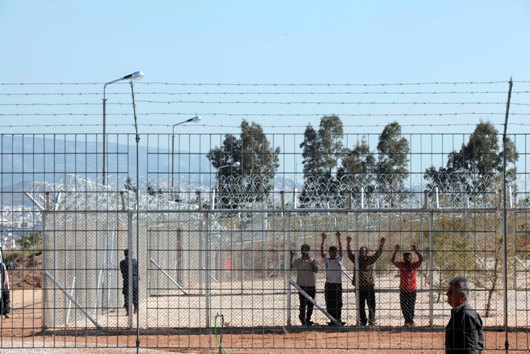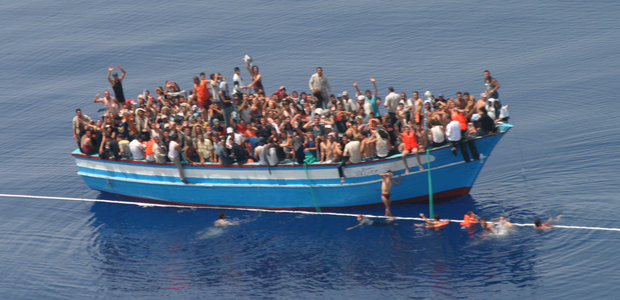Syrian refugees cross the border with Jordan, Source: UNHCR /Jared J. Kohler/
A 48% increase in the number of illegal immigrants crossing the external borders of the European Union (EU) has been reported by the EU border control agency Frontex. Last year the number of recorded border crossings was around 700 million or 170,000 more than in 2012.
The number of illegal immigrants found in the EU in 2013 was 344,000 whereas the rejected permissions of entry increased by 11% compared to 2012, the number of cases registered last year reaching 128,000. The increase in the applications for refugee status submitted by immigrants was 32% in 2013, their total number being 350,000. 160,000 immigrants were deported during the same period or 11% more than in 2012.
The data were presented to the Greek parliament by Executive Director of the office Ilkka Laitinen. The presentation was part of the meeting on migration policy, involving the chairmen of the justice and home affairs commissions of the parliaments of the EU Member States. During the meeting, EU Home Affairs Commissioner Cecilia Malmström admitted that Greece had made important steps in the management of migration flows, however stressing that the conditions in detention centres for immigrants and the time they spend there should be improved.

The data show that the majority of the immigrants who are trying to reach Europe are Syrians. Frontex reports that the most popular channels for trafficking of immigrants are the following:
- The Western Mediterranean channel that passes through the Strait of Gibraltar, where a continuous increase in the number of registered immigrants was established in 2013.
- The highest increase, namely 288% compared to 2012, in the movement of illegal immigrants was recorded in the central part of the Mediterranean, where the number of registered cases increased by 40,000 compared to last year. This route was used by people arriving from the Horn of Africa and Syria, the majority of the cases involving Libyans and Egyptians.
- The third route passes through the Greek-Albanian border. According to Laitinen, it is the result of the cancelled visa procedure. In 2013, the number of illegal migrants crossing the border at this point was 8,700 or 0.59% higher than in 2012.
- No significant developments were recorded on the eastern land border. The number of registered cases was 1,300, which is an 18% increase compared to 2012.
- The route passing through the Western Balkans region was preferred by a growing number of immigrants, the registered cases being 20,000. The majority of them were captured by the Hungarian border patrols.
- A 33% decrease was established on the Eastern Mediterranean route that passes through the Greek islands. However, the number of immigrants using this route remains high as nearly 25,000 cases of illegal crossing were registered last year.
Laitinen stressed that Frontex has turned its attention to the border between Bulgaria and Turkey, as well as to the maritime border between Greece and Turkey. At both places, the illegal immigrants are mostly Syrians. However, in August 2013, the service had established a decrease in the number of cases along the Greek-Turkish land border, the improvement being the result of the operational activities of the Greek border patrols and the measures against illegal immigration taken inside the country.

In connection with Greece, Commissioner Cecilia Malmström said that the problems are understandable in view of the "difficult political and economic situation in the country." In parallel, however, she stressed that the Common European Asylum Policy should be reviewed by the European Court. "All countries need to apply minimal standards to asylum seekers and follow the rules of European law," said Malmström. Then she encouraged Greece’s Minister of Public Order Nikos Dendias and Prime Minister Antonis Samaras, saying that they "are working hard to improve the conditions of reception and the application of European standards."
Malmström also drew attention to the fact that the conditions in the detention centres for immigrants are still far from meeting the standards set by the European Commission. She stated that detention is used too much as a measure to control immigration and determined the time spent in detention centres as "too long", regardless of the reason why each of the immigrants is on Greek territory.
In connection with extradition, Commissioner Malmström said that cases in which asylum seekers were returned to their countries had been recently recorded and insisted on considering all arguments and information provided by the applicants. Furthermore, she expressed hope that the Greek authorities would investigate in depth the tragic accident near Farmakonisi, which killed 14 people, most of whom were women and children. In this connection, it is worth noting that the prosecutor's office in Kos has ordered the interruption of the journalistic investigation of the tragedy, arguing that an investigation by the authorities is currently underway.
In turn, Greek Minister of Public Order Nikos Dendias stressed that the European migration policy should be implemented in a way that would allow the effective dealing with the direct and pressing factors of illegal immigration in times of economic and social instability.